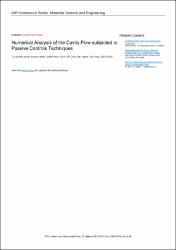Numerical Analysis of the Cavity Flow subjected to Passive Controls Techniques
Abstract
Open-source flow solvers are getting more and more popular for the analysis of challenging flow problems in aeronautical and mechanical engineering applications. They are offered under the GNU General Public License and can be run, examined, shared and modified according to user's requirements. SU2 and OpenFOAM are the two most popular open-source solvers in Computational Fluid Dynamics (CFD) community. In the present study, some passive control methods on the high-speed cavity flows are numerically simulated using these open-source flow solvers along with one commercial flow solver called ANSYS/Fluent. The results are compared with the available experimental data. The solver SU2 are seen to predict satisfactory the mean streamline velocity but not turbulent kinetic energy and overall averaged sound pressure level (OASPL). Whereas OpenFOAM predicts all these parameters nearly as the same levels of ANSYS/Fluent.


















